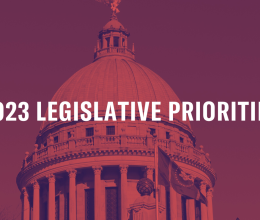By Alison Steiner, President, ACLU of Mississippi Board of Directors
"The capital punishment system is discriminatory and arbitrary and inherently violates the Constitutional ban against cruel and unusual punishment. The ACLU opposes the death penalty in all circumstances, and looks forward to the day when the United States joins the majority of nations in abolishing it.” -ACLU Policy Statement on Capital Punishment
The ACLU has long been known and respected for its unstinting efforts at the elimination of capital punishment, and to securing systemic reform of the death penalty process so long as it is still with us.
Success of the abolition campaigns has been particularly impressive of late. In the last six years six states have decided that they, like U.S. Supreme Court Justice Harry Blackmun, will “no longer tinker with the machinery of death,”i.e.will no longer try to systemically reform something that is not worth the effort of fixing.
Arguments for abolition have successfully invoked the undeniable racial discrimination in who is even prosecuted for death-eligible offenses. They have also relied upon disproportionate rate of DNA-based exonerations of people on death row and the unacceptably high risks of condemnation and execution of the innocent. Where they have worked, these arguments have propelled legislatures and executive branches to find the death penalty not worth its very considerable expense any more.
However, this has happened mostly in states where the death penalty was already falling in to disuse, or, as in Illinois, had already been stopped by executive moratoria and pardons. In most of these places, new death sentences were rare. In some, actual executions so uncommon that no one in the corrections systems had ever performed one.
These same arguments have not had as much traction in the hard core, particularly southern, death penalty states where death rows are large, new sentences, though rarer than before, are still regularly imposed, and executions are being conducted with disturbing frequency.
I think that this may be because the debate has mostly focused on the condemned people – is it unfair to them to be subjected to this racially disproportionate punishment, or face a not insignificant possibility that they are innocent yet condemned, when other, effective means of punishment are also available? Only indirectly does it talk about “us” and our distaste at collaborating in these injustices.
The event in Oklahoma, where the slow, agonizing death suffered by Clayton Lockett was, at least for a short time, witnessed by the world, have shifted that focus. Though it was Mr. Lockett who was being tortured to death, it was “us” – and by “us” I mean even the people conducting the execution – who were horrified by what we were witnessing. Even strong death penalty proponents had to admit that what happened to Clayton Lockett violated the Eighth Amendment.
Most recently, in Arizona, it took the state 1 hour and 57 minutes to execute Joseph Wood who gasped for air 660 times. Arizona rushed to execute him in secret and ignored the warnings of the botched execution of Clayton Lockett in Oklahoma and Dennis McGuire in Ohio.
The conversation about capital punishment is once again questioning whether death penalty can, at least in practice, ever be anything other than a barbarity to which we must just say no, and that taints us as much as it harms the person we have condemned to suffer it.
The mostly conservative, mostly white politicians who, for now at least, still control legislatures and state-houses in the hard-core southern death penalty states, including Mississippi, have no reason to put themselves out politically for the people on death row, even the innocent ones. They can easily rationalize, ignore or deny the arguments that focus on the condemned people.
But like all human beings, most of these powerful men and women want to appear morally upright to the rest of the world. When the conversation focuses on their own part in maintaining a system that can allow someone to be strapped down, improperly sedated and then given just enough poison to cause a fatal heart attack half an hour later, we may be able to get their attention.
At the very least, we need to try.







